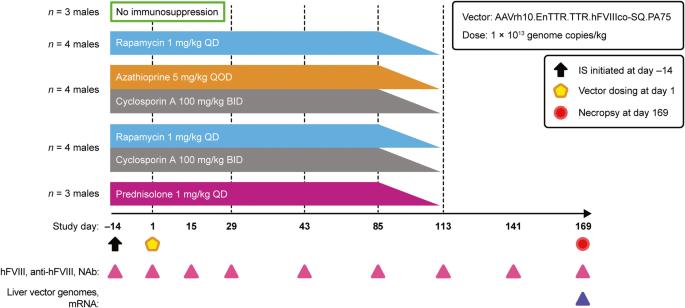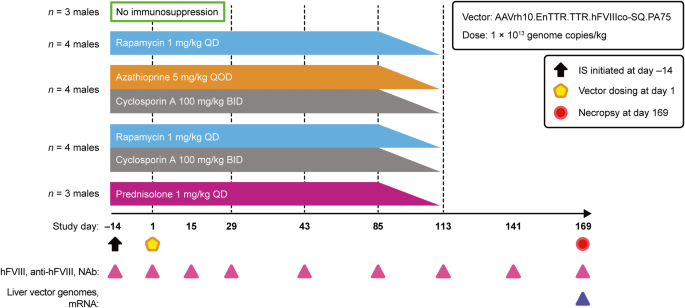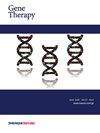泼尼松龙和雷帕霉素降低了食蟹猴的浆细胞基因特征,并可能改善AAV基因治疗。
IF 4.5
3区 医学
Q1 BIOCHEMISTRY & MOLECULAR BIOLOGY
引用次数: 0
摘要
腺相关病毒(AAV)载体基因治疗是治疗罕见遗传病的一种很有前途的方法;然而,一个持续的挑战是如何最好地调节宿主免疫,以提高转导效率和治疗效果。本报告介绍了两项研究,描述了接受表达人凝血因子VIII(hFVIII)的AAVrh10基因治疗载体的雄性食蟹猴的多种预防性免疫抑制方案。在研究1中,与泼尼松龙、雷帕霉素(或西罗莫司)、雷帕霉素和环孢菌素A的联合用药以及环孢霉素A和硫唑嘌呤的联合用药相比,没有免疫抑制作用。泼尼松龙单独表现出较高的平均外周血hFVIII表达;然而,这并没有持续到逐渐减少。抗衣壳和抗hFVIII抗体反应强烈,载体基因组和转基因mRNA水平在尸检时与无免疫抑制相似。研究2比较了单独使用泼尼松龙或与雷帕霉素或甲氨蝶呤联合使用无免疫抑制。泼尼松龙/雷帕霉素组显示hFVIII的平均表达增加,抗衣壳IgG的发育平均延迟,直到雷帕霉素逐渐减少。此外,泼尼松龙/雷帕霉素显著降低了浆细胞基因特征,这表明雷帕霉素的耐受作用可能包括阻断浆细胞分化。泼尼松和雷帕霉素联合免疫抑制可改善AAV载体基因治疗的疗效。本文章由计算机程序翻译,如有差异,请以英文原文为准。


Prednisolone and rapamycin reduce the plasma cell gene signature and may improve AAV gene therapy in cynomolgus macaques
Adeno-associated virus (AAV) vector gene therapy is a promising approach to treat rare genetic diseases; however, an ongoing challenge is how to best modulate host immunity to improve transduction efficiency and therapeutic outcomes. This report presents two studies characterizing multiple prophylactic immunosuppression regimens in male cynomolgus macaques receiving an AAVrh10 gene therapy vector expressing human coagulation factor VIII (hFVIII). In study 1, no immunosuppression was compared with prednisolone, rapamycin (or sirolimus), rapamycin and cyclosporin A in combination, and cyclosporin A and azathioprine in combination. Prednisolone alone demonstrated higher mean peripheral blood hFVIII expression; however, this was not sustained upon taper. Anti-capsid and anti-hFVIII antibody responses were robust, and vector genomes and transgene mRNA levels were similar to no immunosuppression at necropsy. Study 2 compared no immunosuppression with prednisolone alone or in combination with rapamycin or methotrexate. The prednisolone/rapamycin group demonstrated an increase in mean hFVIII expression and a mean delay in anti-capsid IgG development until after rapamycin taper. Additionally, a significant reduction in the plasma cell gene signature was observed with prednisolone/rapamycin, suggesting that rapamycin’s tolerogenic effects may include plasma cell differentiation blockade. Immunosuppression with prednisolone and rapamycin in combination could improve therapeutic outcomes in AAV vector gene therapy.
求助全文
通过发布文献求助,成功后即可免费获取论文全文。
去求助
来源期刊

Gene Therapy
医学-生化与分子生物学
CiteScore
9.70
自引率
2.00%
发文量
67
审稿时长
4-8 weeks
期刊介绍:
Gene Therapy covers both the research and clinical applications of novel therapeutic techniques based on a genetic component. Over the last few decades, significant advances in technologies ranging from identifying novel genetic targets that cause disease through to clinical studies, which show therapeutic benefit, have elevated this multidisciplinary field to the forefront of modern medicine.
 求助内容:
求助内容: 应助结果提醒方式:
应助结果提醒方式:


